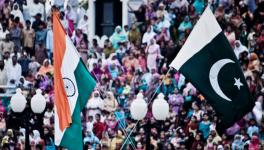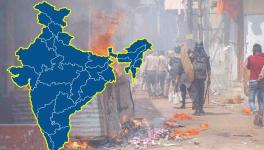A Hunger Strike for Kashmiri Pandits the Media Ignores
Image Courtesy: The wire
These days, the term “Kashmiri Pandit” is readily bandied about in our social and political life. The moment a question about Kashmir is raised, a rebuttal is sure to follow: “Where were you when Pandits were forced to leave the Valley?” This is the insurmountable logic that the right wing actively deploys to cloak its own wrong-doings. When Articles 370 and 35A were abrogated, Pandits across the world were jubilant and filled with a sense of revenge. The oft-repeated claim that the abrogation would help rehabilitate Kashmiri Pandits in the Valley resurfaced, along with claims that the changed status of Jammu and Kashmir was the justice that Pandits had been waiting for. But more than a year has passed and there is no sign of a process for migrant Pandits to return.
Meanwhile, the discontent of resident Pandits has risen to the extent that their leader, Sanjay Tickoo, has been on a fast unto death for the last nine days. It may seem surprising that there is radio silence over this. There is no yelling in the mainstream media and no cacophony on social media. None of the prime-time crusaders is marching up with a flag bearing the Pandit banner. The headlines are not filled with the usual clamour for their rehabilitation either. However, such apathy is not new for the resident Pandits who—just to mainstream the migrants—have been given the ridiculous nomenclature of “non-migrant Pandits” by the media and administration.
Resident Pandits: an invisible minority
Contrary to popular belief, Pandits were a miniscule minority with a population share of about 4 to 4.5% of Kashmiri society prior to their mass exodus in the nineties. Yet they were an influential community in the Valley. How important the Kashmiri Pandits considered government employment is evident from the censuses of the early twentieth century, in which the community called it their “traditional occupation”. The prominent Kashmiri Pandit historian, PN Bazaz, once said that a new-born Pandit was blessed to be a government servant! As a traditionally educated upper caste community, they steered away from manual labour in agriculture or handicrafts, and government services became their source of respectability and opportunity to enter the power structures, Indian or dominated by foreign rulers.
In any case, as an educated middle class emerged in the Muslim community, government jobs became a bone of contention between the two communities. The struggle intensified as education spread to all social groups in Jammu and Kashmir, especially after the 1930s. The discontent spread even more after Independence, when political power shifted to the majority community. Even prior to the nineties, it was quite common for Kashmiri Pandits to migrate to cities outside the Valley and abroad in search of jobs, but that decade changed everything. By the end of the last century, after their mass exodus under the fear psychosis generated by the outbreak of militancy, the Pandits gradually dwindled to an invisible micro-minority.
Nevertheless, there still are 808 Pandit families in the Valley who never migrated. This fact disturbs all those who espouse extremist narratives and is also inconvenient for everyone else. While the Pandit migrants deny the existence of resident Pandits, so that they can claim every single one of them was forced to leave, and that they would have been butchered if they had not, the other side celebrates the presence of these Pandit families in order to deny their claims. Yet, even this section maintains an absolute silence on the rights and representation of resident Pandits in the socio-economic life of the Valley.
Dr. Amit Wanchoo, a philanthropist residing in the Jawahar Nagar area of Srinagar, the capital, says that apart from a few families, such as his, which decided to stay put out of conviction, almost the entire middle class in the Kashmiri Pandit community has migrated out of the erstwhile state. Government servants were promised salaries and other perks in Jammu, and the general thinking at the time was that they would return in a year or two, once the situation is normalised. But migration was not an easy decision for the lower strata of Kashmiri society and it was risky for those who owned substantial properties in the Valley as well. Thus, the have-nots were forced to stay on while the super rich decided to not shift at all or migrate partially.
Any survey of resident Pandits would confirm this phenomenon. Asha Devi of Kunjar Vusan village in North Kashmir, who was elected a panch of her village, says that the richer Pandits of her village migrated in the dark of night without informing the poorer ones. She and her fellow Pandits who did not have enough money to migrate decided to stay on. Thus they remained the lower strata of Kashmiri society, doing menial jobs in the private sector or managing small businesses. While there are few notable Pandit families in Srinagar and few other places, most of the older prominent clans have moved, with children, to the metros of India or abroad.
The Kashmiri Pandit Sangharsh Samiti (KPSS) is a representative body of the former set—the residents—and it has been working continuously on a two-pronged agenda. First, to ensure a life of dignity for the community; and second, to prove that they exist and end their neglect. They started celebrating Dussehra since 2007, arranged Shobha Yatras and workshops on Pandit culture in schools and colleges and they are also fighting a lone legal battle for the resident Kashmiris.
The grievances
For years, the KPSS has demanded a share for resident Kashmiris in the package announced in 2009 by the Prime Minister for the rehabilitation of migrant Pandits. In 2013, the chairperson of KPSS, Sanjay Tickoo, filed a case in the Jammu and Kashmir High Court and made representations before two parliamentary committees. The issue was raised in Parliament and various reports have highlighted the “non-migrant” Pandit community’s dire need for support.
In 2016, the High Court decided in their favour, but the ruling was stayed in 2019 after the Sikh community raised objections. However, the court cleared the matter in 2020. Once again, hopes soared among the resident Pandits. Soon, they thought, the process of accommodating their eligible wards in state government services would begin. But, as Rattan Chaku, the general secretary of KPSS puts it, their files are locked in the safes of the Disaster Management, Relief, Rehabilitation and Reconstruction (DM-RR&R). Administrative apathy and confusion is apparent.
The case of Pradeep Bhatt, a resident of Badgam, is an appalling instance. He applied for rehabilitation aid for his house, but the authority informed him that only the pre-1989 migrants are eligible for this aid, although migration had only started in 1990 and the High Court decision clearly says non-migrant Pandits qualify for this aid.
Now the abrogation of Art. 370 and resultant lockdown have ruined Kashmir’s economy and snatched jobs and businesses from many Pandits too. The Covid-19 outbreak has only made things worse, and an apathetic administration has created a do-or-die situation. As Chaku says, “Was it our fault we decided to stay? Our children are cursing us. If this is what a Pandit is to face in Kashmir, do you really think the others will decide to return?” Chaku raises a pertinent question here: officially, it is evident that jobs are to be given to those Pandits who do not want to stay in the Valley and who return to Jammu whenever the situation turns difficult. Meanwhile, those who never left their homeland against all odds are kept out of official employment opportunities.
It is these circumstances which led Sanjay Tickoo to undertake a fast unto death from 20 September at the campus of the historical Ganpatyar Temple in Habba Kadal area of down-town Srinagar, which is also the office of the KPSS. Youth from different regions have joined him in a relay fast.
A charter of demands
The non-migrant Kashmiri Pandit community is economically deprived and socially vulnerable. KPSS is demanding a quota of 500 jobs in the package, a monthly financial assistance in line with migrant Pandits and financial assistance for housing for the vulnerable in the community. These too are part of the High Court ruling.
Tickoo claims that more than 150 families out of the 808 in the Valley are below the poverty line and in urgent need of economic support and rehabilitation. Besides, social animosity has increased after the abrogation of Art. 370 and if they continue to be neglect they will be forced to leave the Valley in search of livelihoods. He says there is no legal hurdle in implementing these demands, but a few corrupt officials in the DM-RR&R office are creating unnecessary roadblocks, which he has repeatedly complained about since June this year. Action against such officials is also part of their demands.
Action that only leads to inaction
A week of fasting seems to have had no impact on the administration or the society. After all, the resident Pandits are a micro-minority even within the tiny Pandit community. Besides, the latter do not want to share their privileges and turn a deaf ear to the grievances of the residents. Most Kashmiris are so deeply entangled in their own issues that they have little or no time to think about their fellow travellers. Few find an outlet in venting their anger against the government of India. But for the rest of India, the resident Kashmiri Pandits simply do not exist. Their demands are no match for the sensational “news” emerging out of Bollywood. As it does not posses the spice of communalism that can line many migrant’s stories, it is useless for our meritorious newsrooms.
Recently, the Lieutenant-Governor announced the reallocation of 2,000 posts for Kashmiri Pandits under Prime Minister Narendra Modi’s package for the erstwhile state, but there was no mention of any sub-allocation for the “non-migrant” Pandits. Apart from the National Conference, political outfits have not supported this cause until now. Meanwhile, an emissary of the government was also unable to placate the aggrieved community.
When asked about whether he still hopes for assistance, Tickoo answers with a faded smile—“Roz roz marne se ek baar mar jaana behtar hai—better to die once than a slow death.” The gung-ho politics about Kashmiri Pandits and absolute silence over the plight of resident Pandits raises a significant question: are we, as a nation, failing all our minorities day after day?
Ashok Kumar Pandey is the author of Kashmirnama and Kashmir and Kashmiri Pandits. The views are personal.
Get the latest reports & analysis with people's perspective on Protests, movements & deep analytical videos, discussions of the current affairs in your Telegram app. Subscribe to NewsClick's Telegram channel & get Real-Time updates on stories, as they get published on our website.
























